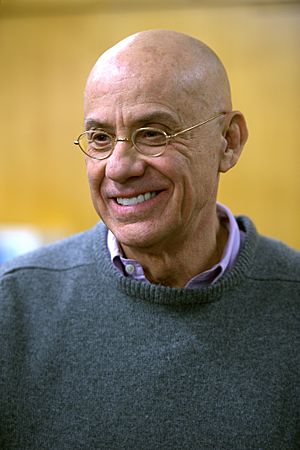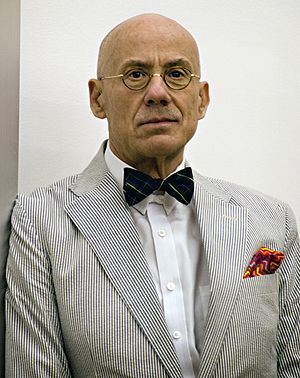James Ellroy facts for kids
Quick facts for kids
James Ellroy
|
|
|---|---|

Ellroy in 2011
|
|
| Born | Lee Earle Ellroy March 4, 1948 Los Angeles, California, U.S. |
| Occupation | Crime writer, essayist |
| Education | Fairfax High School (expelled) |
| Genre | Crime fiction, historical fiction, mystery fiction, noir fiction |
| Years active | 1981–present |
| Notable works |
|
| Spouse |
Mary Doherty
(m. 1988; div. 1991)Helen Knode
(m. 1991; div. 2006) |
| Partner | Erika Schickel (sep.) |
| Military career | |
| Allegiance | |
| Service/ |
|
| Years of service | 1965 (3 months) |
Lee Earle "James" Ellroy (born March 4, 1948) is an American writer. He is famous for his crime fiction novels and essays. Ellroy is known for his unique writing style. He often uses short, sharp sentences. Some of his most famous books are The Black Dahlia (1987) and L.A. Confidential (1990).
Contents
Life of James Ellroy
Early Years and Family
James Ellroy was born in Los Angeles, California. His mother, Geneva Odelia, was a nurse. His father, Armand, was an accountant. His parents divorced in 1954. After the divorce, James and his mother moved to El Monte, California.
When James was ten years old, his mother was murdered. This was a very difficult time for him. He then went to live with his father. His father allowed him to read and explore on his own.
School and Early Jobs
In 1962, Ellroy started attending Fairfax High School. He was expelled from school in 11th grade. His father died shortly after this.
After high school, Ellroy joined the U.S. Army for a short time. He was discharged after three months.
Ellroy credits public libraries for helping him learn to write. He worked shelving books at a public library. He said, "I am a product of the L.A. County Public Library System." For a while, he was without a home. He later started working as a golf caddie. This job gave him time to write his books. He continued caddying until his fifth book was sold.
Personal Life
On October 4, 1991, Ellroy married writer Helen Knode. They later divorced in 2006. Ellroy has stated that he prefers to live in a separate apartment from his partner.
Literary Career
In 1981, Ellroy published his first novel, Brown's Requiem. It was a detective story. He then wrote Clandestine and Silent Terror. After these, he wrote the Lloyd Hopkins Trilogy. These books are about a detective named Hopkins.
Ellroy is a private person. He doesn't own a television. He also says he rarely reads books by other modern authors. He wants to make sure his own writing style stays unique. However, he read many books by authors like Dashiell Hammett and Raymond Chandler when he was younger.
Writing Style
Ellroy's books often have complex plots. They also show a serious view of the world. His writing has earned him the nickname "Demon dog of American crime fiction."
He writes his books by hand on paper. He creates very detailed outlines for his stories. These outlines can be hundreds of pages long.
His dialogue and narration often use old-fashioned slang. He also uses a very short, sharp sentence style. This style became famous when his editor asked him to shorten his novel L.A. Confidential. Instead of removing parts of the story, he cut out every extra word from each sentence. This created his unique and powerful writing style.
The L.A. Quartet Series
Ellroy became very famous with his series called the L.A. Quartet. This series includes The Black Dahlia, The Big Nowhere, L.A. Confidential, and White Jazz. These novels mix real historical events with fictional stories. For example, The Black Dahlia combines a real-life murder with a fictional police investigation.
Underworld USA Trilogy Series
In 1995, Ellroy published American Tabloid. This was the first book in his "Underworld USA Trilogy" series. He calls this series a "secret history" of the mid-to-late 20th century. American Tabloid was named TIME magazine's fiction book of the year in 1995. The next book, The Cold Six Thousand, became a bestseller. The final novel, Blood's a Rover, was released in 2009.
My Dark Places Memoir
After American Tabloid, Ellroy wrote a memoir called My Dark Places. A memoir is a book about a part of the author's own life. In this book, Ellroy writes about his mother's murder. He and an investigator worked on the case. They tried to find out what happened to his mother. The investigation continues, and information can still be sent to the detective.
Other Works and Projects
Ellroy is currently writing a "Second L.A. Quartet" series. These books take place during Second World War. Some characters from his earlier series appear as younger versions of themselves. The first book in this new series, Perfidia, came out in 2014. The second book, This Storm, was released in 2019.
In 2015, Ellroy worked with the Los Angeles Police Museum. They released a book called LAPD '53. It features old photographs from the museum's archives. Ellroy wrote about crime and law enforcement from that time.
In 2023, Ellroy announced a change to his "Second L.A. Quartet." He will now write a quintet, which means five books. The later books will be set in the 1960s. They will connect back to the World War II setting of the first books.
Views and Beliefs
Ellroy has a strong public personality. He often talks about his work in a very confident way. For example, he once said he is "the greatest crime novelist who ever lived."
Many of Ellroy's books, like The Big Nowhere and L.A. Confidential, tell the story from different characters' points of view. His novels often explore the connection between corruption and law enforcement.
A common idea in Ellroy's work is that "closure" (finding a complete end to something) is not always real. Characters often die or disappear suddenly. This shows that life doesn't always have neat endings.
Ellroy has stated that he is done writing traditional crime novels. He now wants to write "big political books" about Los Angeles.
Religion
Ellroy was raised in a Dutch Lutheran Church. In 2013, he stated, "I'm a Christian." He believes that his faith has helped him through difficult times. He also says his faith influences his novels. He describes his books as "stories of redemption," meaning stories about people finding a way to improve their lives.
Film Adaptations and Screenplays
Many of Ellroy's books have been made into films. These include Blood on the Moon (made into Cop), L.A. Confidential, and The Black Dahlia. Other writers usually write the screenplays for these movies.
Ellroy also co-wrote the original screenplay for the 2008 film Street Kings. In 2009, Ellroy said that all movie adaptations of his books were "dead." As of 2023, he does not answer questions about film adaptations or scripts he wrote.
In 2024, it was reported that Ellroy had signed with a Hollywood agency. Producers are now looking to make a film based on his latest novel, The Enchanters.
Filmography
Documentaries
- 1993 James Ellroy: Demon Dog of American Crime Fiction
- 1995 White Jazz
- 2001 James Ellroy's Feast of Death
- 2005 James Ellroy: American Dog
- 2006 Murder by the Book: "James Ellroy"
- 2011 James Ellroy's L.A.: City of Demons
Films
- 1988 Cop
- 1997 L.A. Confidential
- 1998 Brown's Requiem
- 2002 Stay Clean
- 2002 Vakvagany
- 2002 Dark Blue
- 2003 Das Bus
- 2005 James Ellroy presents Bazaar Bizarre
- 2006 The Black Dahlia
- 2008 Street Kings
- 2008 Land of the Living
- 2011 Rampart
Television
- 1992 "Since I Don't Have You" adapted by Steven A. Katz for Showtime's Fallen Angels.
- 2011 James Ellroy's L.A.: City of Demons for Investigation Discovery.
See also
 In Spanish: James Ellroy para niños
In Spanish: James Ellroy para niños
 | Janet Taylor Pickett |
 | Synthia Saint James |
 | Howardena Pindell |
 | Faith Ringgold |


